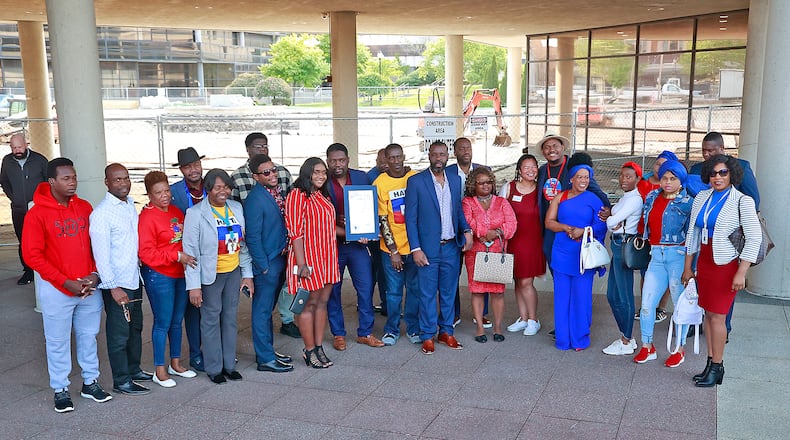Temporary Protected Status allows an eligible person who receives approval to remain in the U.S. for a designated period of time but does not provide a direct path to citizenship. The Homeland Security secretary can grant temporary protection for different nationalities based on conditions in their home countries. The protection also allows them to apply for a work permit.
Humanitarian parole is a temporary entry that is granted when there is an urgent humanitarian need or a compelling emergency for individuals who would otherwise be ineligible for entry into the U.S.
Parole is not a status and does not provide a pathway to citizenship. Those under parole undergo removal proceedings while they apply for work permits, asylum, TPS or other forms of status.
Katie Kersh, senior attorney with Advocates for Basic Legal Equality, said under the law Trump could decline to extend TPS when it comes up for renewal in February 2026 and he could decline to redesignate the status for people who have come from Haiti to the U.S. after June 3 of this year. Those individuals would have no legal basis for remaining in the country unless they applied for asylum, Kersh said.
Trump may try to end TPS early, but Kersh said this would be met with legal challenges, for which there would be very strong arguments that it is unlawful to terminate the period of TPS early.
However, it would be much easier for the incoming president to terminate humanitarian parole, which would open up many people to deportation if they did not have another status like asylum or TPS, Kersh said.
Immigration courts in the U.S. face a large backlog and everyone facing the threat of deportation has a right to a hearing, so Kersh said she is not sure how Trump would remove a large number of people in a short period of time from a legal standpoint.
“One of the big misconceptions both in immigrant and ... receiving communities is that mass deportations look like people being put on a plane tomorrow, and that’s not the case,” Kersh said. “If somebody’s here today and they have parole or they have TPS and pending a final application, they’re not going to be put on a plane back to Haiti tomorrow.”
President Joe Biden could likely extend TPS to Haiti again before he leaves office, but he would have to publish it in the federal register and announce it soon, Kersh said. She said an individual extension or designation can only last up to 18 months.
Previous attempt unsuccessful
Trump has previously attempted to end TPS for Haitian immigrants. In 2017, the former president’s Department of Homeland Security announced the end of the program on the grounds that the country no longer met the conditions for designation. This led to five federal lawsuits, arguing that DHS Secretary Elaine Dukes violated the due process of Haitians with TPS when DHS ignored expert reports that the conditions in Haiti made it still eligible for the designation.
A New York U.S. District judge ruled in April 2019 that the Trump administration had been motivated by politics and he issued a nationwide injunction that blocked the country from terminating the TPS designation for Haiti.
In May 2021 under the Biden administration, DHS Secretary Alejandro Mayorkas announced a new 18-month designation for Haiti. It was then extended and redesignated from Feb. 4, 2023 to Aug. 3, 2024, before being extended and redesignated again from Aug. 4, 2024 to Feb. 3, 2026.
Trump, his Vice President-elect JD Vance and other right-wing Republicans have attacked Haitian immigrants in Springfield since September, when the city was thrust into the national spotlight when a claim went viral that Haitian immigrants were eating people’s pets. Law enforcement and city officials have repeatedly said there is zero evidence to back these claims.
Haiti has seen turmoil over the last several years, having been hit by multiple natural disasters as well as political and economic instability. In 2021, Haiti’s president was assassinated in his home and a prime minister was confirmed; he also took on the role of acting president. The country was struck by another earthquake soon after.
Since then, gang violence has taken over multiple regions of the country, including the capital of Port-au-Prince. In 2023, reports of homicides, rapes and kidnappings rose and the U.S. ordered all non-essential personnel to leave the country. By September 2023, reports indicated that gangs controlled 80% of the nation’s capital.
Gang violence shut down the country’s international airport on Monday as a new prime minister was sworn in, according to the Associated Press.
Trump’s election has caused a lot of fear in the Haitian community, said Vilès Dorsainvil, Haitian Community Help and Support Center president. The community center is working to educate Haitian immigrants on the protections afforded by the law and the U.S. Constitution in an effort to assuage some of the fears.
The community center has also been creating a network of immigration attorneys.
ABLE has been a leading organization in legal action to fight against civil rights violations, and Kersh said it is prepared to continue under Trump again.
About the Author

